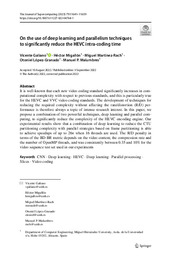Por favor, use este identificador para citar o enlazar este ítem:
https://hdl.handle.net/11000/30426Registro completo de metadatos
| Campo DC | Valor | Lengua/Idioma |
|---|---|---|
| dc.contributor.author | Galiano, Vicente | - |
| dc.contributor.author | Migallon, Hector | - |
| dc.contributor.author | Martínez-Rach, Miguel Onofre | - |
| dc.contributor.author | López Granado, Otoniel Mario | - |
| dc.contributor.author | Perez Malumbres, Manuel | - |
| dc.contributor.other | Departamentos de la UMH::Ingeniería de Computadores | es_ES |
| dc.date.accessioned | 2023-12-19T10:00:28Z | - |
| dc.date.available | 2023-12-19T10:00:28Z | - |
| dc.date.created | 2022-08 | - |
| dc.identifier.citation | The Journal of Supercomputing (2023) 79 | es_ES |
| dc.identifier.issn | 1573-0484 | - |
| dc.identifier.issn | 0920-8542 | - |
| dc.identifier.uri | https://hdl.handle.net/11000/30426 | - |
| dc.description.abstract | It is well-known that each new video coding standard signifcantly increases in computational complexity with respect to previous standards, and this is particularly true for the HEVC and VVC video coding standards. The development of techniques for reducing the required complexity without afecting the rate/distortion (R/D) performance is therefore always a topic of intense research interest. In this paper, we propose a combination of two powerful techniques, deep learning and parallel computing, to signifcantly reduce the complexity of the HEVC encoding engine. Our experimental results show that a combination of deep learning to reduce the CTU partitioning complexity with parallel strategies based on frame partitioning is able to achieve speedups of up to 26× when 16 threads are used. The R/D penalty in terms of the BD-BR metric depends on the video content, the compression rate and the number of OpenMP threads, and was consistently between 0.35 and 10% for the video sequence test set used in our experiments | es_ES |
| dc.format | application/pdf | es_ES |
| dc.format.extent | 19 | es_ES |
| dc.language.iso | eng | es_ES |
| dc.publisher | Springer | es_ES |
| dc.rights | info:eu-repo/semantics/openAccess | es_ES |
| dc.rights.uri | http://creativecommons.org/licenses/by-nc-nd/4.0/ | * |
| dc.subject | CNN | es_ES |
| dc.subject | Deep learning | es_ES |
| dc.subject | HEVC | es_ES |
| dc.subject | Deep learning | es_ES |
| dc.subject | Parallel processing | es_ES |
| dc.subject | Slices | es_ES |
| dc.subject | Video coding | es_ES |
| dc.subject.other | CDU::6 - Ciencias aplicadas::62 - Ingeniería. Tecnología | es_ES |
| dc.title | On the use of deep learning and parallelism techniques to signifcantly reduce the HEVC intra‑coding time | es_ES |
| dc.type | info:eu-repo/semantics/article | es_ES |
| dc.relation.publisherversion | https://doi.org/10.1007/s11227-022-04764-1 | es_ES |

Ver/Abrir:
s11227-022-04764-1.pdf
882,05 kB
Adobe PDF
Compartir:
 La licencia se describe como: Atribución-NonComercial-NoDerivada 4.0 Internacional.
La licencia se describe como: Atribución-NonComercial-NoDerivada 4.0 Internacional.
.png)